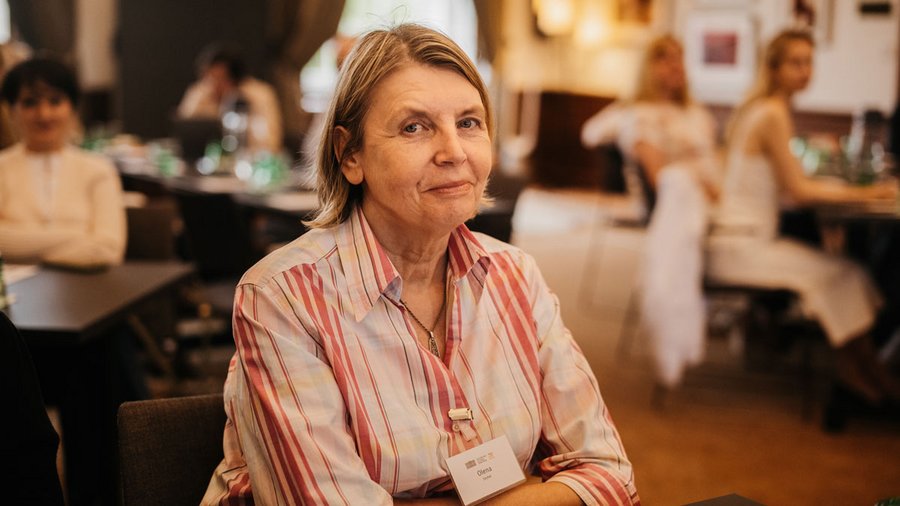Olena Orzhel on knowledge sharing and the role of universities during and after the war
“The voice of higher education should be heard; we should make it louder. Cooperating with civil society is an opportunity to be heard.”
Olena Orzhel is a senior researcher at the Institute of Higher Education with the National Academy of Educational Sciences of Ukraine. She was a participant at Salzburg Global’s Connecting and Supporting Ukrainian Civil Society in Time of War.
“We are already having very active conversations, and people in my group on education systems change all the time, so we hear the opinions and ideas of different people. It is for me an opportunity to have a broader picture of what people think. For instance, in our last group, we had quite a big representation of people and experts from NGOs who are involved in informal education, working with businesses and adults. (…) It is really nice to know that they are very optimistic, that we think we can advance in our lifelong learning adult education”, said Olena during the program.
Olena has been a Salzburg Global Fellow since 2018, where she attended Session 603 – Social and Emotional Learning: A global Synthesis. Since then, she has attended several other Salzburg Global programs online, ranging from Social and Emotional Learning in the Mediterranean Region, to Designs on the Future: Who Owns the Past?
Olena decided to attend Salzburg Global’s latest session to amplify the role of higher education, especially during, and after the war in Ukraine. But what role do universities have to play in this conflict?
“I strongly believe in knowledge society, and I believe that knowledge today is a major asset, a major tool for problem-solving and peacebuilding. If we apply knowledge properly, we can solve most of our problems, and we can start now”, said Olena.
She believes that while the Ukrainian education system is good at generating and disseminating knowledge, the utilization of that knowledge is lacking.
“Many problems that we have in our society, at least in the social sphere could have been solved with knowledge. We are quite good at resilience, the war has demonstrated this, but for example conflict resolution, tolerance, multicultural communication, conflict between East and West, (these issues) happened partly because there was not enough knowledge sharing. If we now learn to apply knowledge properly, look at our own history but also at the global experience, we might solve these issues.”
Olena believes social, as well as technological issues could find solutions through knowledge sharing. Because of the ongoing war, Ukraine is starting to deal with an enormous amount of construction garbage, ruins of buildings destroyed.
“In other places of the European Union, there are very effective technologies to deal with this construction rubbish. If for instance we come and ask for this technology, for them to give us the knowledge, we could deal with this issue faster. And in my understanding, knowledge is basically concentrated in universities, so they are partners of the recovery process.
“And now, as we are dealing with the war, and rethinking our economy, talking about Europeanization, war traumas, and the rest of the problems we have to deal with, we need people with high quality education. In my opinion, at this moment of our history, Ukraine needs more higher education, not less.”
This might prove difficult as less students are applying to universities due to the war, some of them refugees in other European countries, others afraid to go to big cities that could be a threat to their safety.
“There will be a lot less people this year, but we are discussing in our group about education systems, what we can do so we don’t lose our students to the European countries and so they come back, because we need them in Ukraine”, explained Olena.
What does Olena hope comes out of the Salzburg Global program?
“To prepare a good action plan for education, from preschool to adult education. It is equally important as higher education today. There will be a lot of new skills that will be necessary for this recovery period and reconciliation and revival. I could say we expect more support from international donors, but this is only part of the story, and I think that our leadership, either individual or institutional will also change many things positively.
“And this networking that we are doing during this Seminar is also a very important part of the story as we will be using the expertise of the experts here, our contacts, our colleagues, our friends. When we go back to Ukraine, we can rely on each other and hopefully will be able to implement many projects with or without international support.”
The Fellows of this session have drafted a Salzburg Statement, in which they set out the priorities and recommendations from Ukrainian civil society identified at this meeting.
To read the Salzburg Statement, click here.


